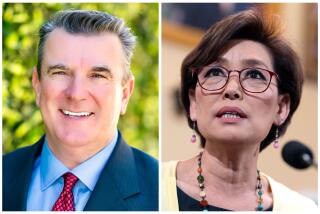Kim Young Sam Accepts Nomination, Asks Rival to Quit
- Share via
SEOUL, South Korea — Kim Young Sam, cementing his opposition candidacy, accepted the presidential nomination of the fractured Reunification Democratic Party on Monday and called again on his rival, Kim Dae Jung, to return to the fold.
“I know that fielding a single presidential candidate from our democratic forces is a mandate,” Kim told 1,200 cheering supporters packed into an auditorium in downtown Seoul. “On my part, I have made efforts. . . . But I regret that Kim Dae Jung deserted . . . to form his own party.”
Asked later at a press conference whether under any circumstances he would withdraw in favor of Kim Dae Jung, the new nominee avoided giving a direct answer but insisted that only he could unify the opposition.
“The tide is on my side,” he said. “Day by day, the political climate will be changing in my behalf.”
He predicted that he will win more than half the vote in the December election even if all four major candidates are still in the race--himself, Kim Dae Jung, ruling party nominee Roh Tae Woo and former Prime Minister Kim Jong Pil.
Kim Young Sam told his followers: “I accept the nomination . . . in obedience to your mandate to terminate the military rule and complete the revolution for democratization.”
The audience, which included U.S. Ambassador James R. Lilley and Japanese Ambassador Shinichi Yanai, responded with spirited chants of “Kim Young Sam! Kim Young Sam!”
Kim, 59, a declared candidate since Oct. 10, called late last month for a vote of the Reunification Democratic Party membership to decide who would carry the opposition banner in the election, which is expected to take place between Dec. 15 and 19. By law, the election must take place within 30 days after the date has been set.
Kim Dae Jung, his 63-year-old rival, rejected the showdown vote as “too late” and said it was he who had the overwhelming support of the voters. On Oct. 28, the elder Kim officially announced that he, too, was running and established the Peace-Democratic Party. Twenty-two National Assembly members who joined him in bolting the main opposition party formed the nucleus of the party.
The new party is scheduled to nominate Kim Dae Jung on Thursday, in the same hall where Kim Young Sam accepted his nomination Monday, formally splitting the opposition and demonstrating that Korean voters are still more committed to personalities than policies.
“Parties coalesce around the man,” a Western diplomat observed as the opposition split became certain. “It’s personalist. Ideology has never been at the forefront here.”
‘Friendly President’
Accepting his party’s nomination, Kim Young Sam portrayed himself as the future “friendly president” of South Korea.
“My administration will be a friendly government . . . a clean government . . . an honest government,” he said, condemning the seven-year presidency of former Gen. Chun Doo Hwan and the ruling Democratic Justice Party as one that has “infiltrated into every corner of the society by means of intelligence politics and political maneuverings.”
In a surprise announcement, Kim named former army Chief of Staff Chung Seung Hwa as an adviser to his party. Chung was the martial-law commander ousted in the Dec. 12, 1979, army mutiny that solidified Chun’s grip on power.
“I will join the march for democracy by joining hands with Kim Young Sam,” Chung told the cheering opposition party delegates.
Before Kim Dae Jung took a third of its assemblymen into his new party, the Reunification Democratic Party represented the latest attempt to form a combined opposition here in the face of authoritarian governments. In the 1950s, the Democratic Party led the opposition to the presidency of Syngman Rhee. It was succeeded by the New Democratic Party during the rule of Park Chung Hee in the 1960s and 1970s. Between elections, the main opposition party often collapsed into factions backing popular political leaders, then came together again at election time.
In the 1985 parliamentary elections, the opposition ran under the banner of the New Korea Democratic Party, which was torn apart last spring when the two Kims broke away to form the now-split Reunification Democratic Party.
Last week, Lee Min Woo, president of the New Korea Democratic Party, retired from politics, probably spelling the death of that effort at creating an opposition front. And with Kim Young Sam’s nomination Monday and Kim Dae Jung’s expected nomination on Thursday, a combined opposition effort seems to be out for this election.
More to Read
Sign up for Essential California
The most important California stories and recommendations in your inbox every morning.
You may occasionally receive promotional content from the Los Angeles Times.










